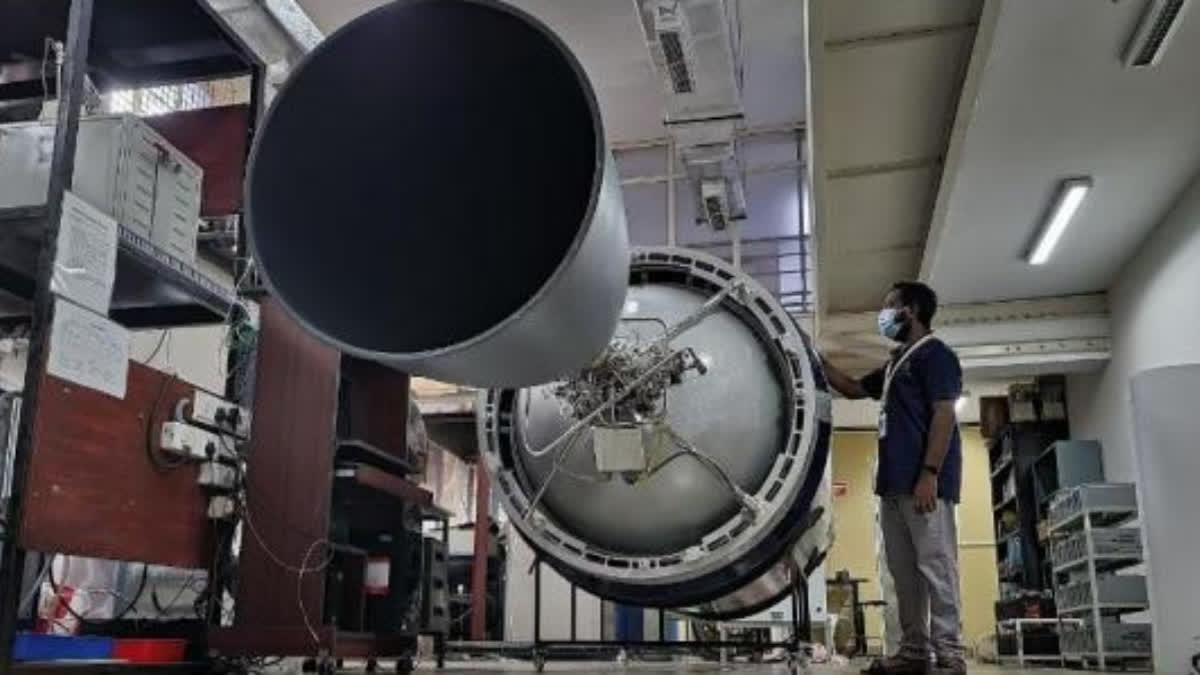Chennai: In a significant boost to private participation in the space industry, Chennai-based start-up Agnikul Cosmos, will become the first private player in the country to make an entry into space with a test firing of its technology demonstrator, Agnibaan, in September.
The rocket has been stationed at the launchpad set up at the Satish Dhawan Space Centre at Sri Harikota and is being monitored by the Indian Space Research Organisation (ISRO).
“Once the technology demonstrator with cryogenic technology, intended only to reach an altitude of 30 to 40 km, proves to be a success, the startup of IIT-Madras will get the go-ahead for commercial launches,” says Professor SR Chakravarthy, Department of Aerospace Engineering, IIT-Madras.
The rocket designed and produced with 3-D technology will greatly reduce the cost of satellite launches, he added. With 3-D printing technology, the rocket and its engines can be made ready in less than a week, making it a cost-effective launch vehicle, he pointed out.
-
Agnibaan SOrTeD (Suborbital Tech Demonstrator) is a single-stage launch vehicle driven by Agnikul’s patented Agnilet engine– an entirely 3D-printed, single-piece, 6 kN semi-cryogenic engine. Agnibaan SOrTeD will lift off vertically & follow a predetermined trajectory (2/n)
— AgniKul Cosmos (@AgnikulCosmos) August 17, 2023 " class="align-text-top noRightClick twitterSection" data="
">Agnibaan SOrTeD (Suborbital Tech Demonstrator) is a single-stage launch vehicle driven by Agnikul’s patented Agnilet engine– an entirely 3D-printed, single-piece, 6 kN semi-cryogenic engine. Agnibaan SOrTeD will lift off vertically & follow a predetermined trajectory (2/n)
— AgniKul Cosmos (@AgnikulCosmos) August 17, 2023Agnibaan SOrTeD (Suborbital Tech Demonstrator) is a single-stage launch vehicle driven by Agnikul’s patented Agnilet engine– an entirely 3D-printed, single-piece, 6 kN semi-cryogenic engine. Agnibaan SOrTeD will lift off vertically & follow a predetermined trajectory (2/n)
— AgniKul Cosmos (@AgnikulCosmos) August 17, 2023
According to him, Agnibaan has the capacity to carry payloads weighing 30 kg to 300 kg and station them at an altitude ranging from 500 km to 700 km in the Low Earth Orbit where most of the satellites are placed.
“The tiny launch pad, measuring 800 ft, has been specifically allotted by ISRO for Agnikul and was inaugurated by ISRO chairman S Somnath last year. And, on Independence Day last month, the ready-to-launch Agnibaan was stationed there. Under the direct supervision of ISRO, its readiness will be scrutinised before according to the clearance for the launch,” Professor Chakravarthy explained, adding that the start-up will enter the burgeoning market of the commercial launch of satellites from 2025 onwards.
“A single-stage launch vehicle, it bursts into space vertically to reach low earth orbit. In the event of the rocket deviating from the pre-designed path, it could be destroyed through a command from the ground station,” he said. “Our launchpad at SHAR is the smallest in the world and we are also actively considering expanding the launchpad for which we have to secure permission and clearance from ISRO,” Chakravarthy said.
“Gone are the days of huge and mammoth satellites. Small payloads can be clubbed together and placed in orbit like the call taxi service. Agnibaan is designed in such a way” he quipped. Started in 2017, Agnikul's entry into commercial satellite launches in 2025 will mark a major milestone for private participation in the Indian space sector.



